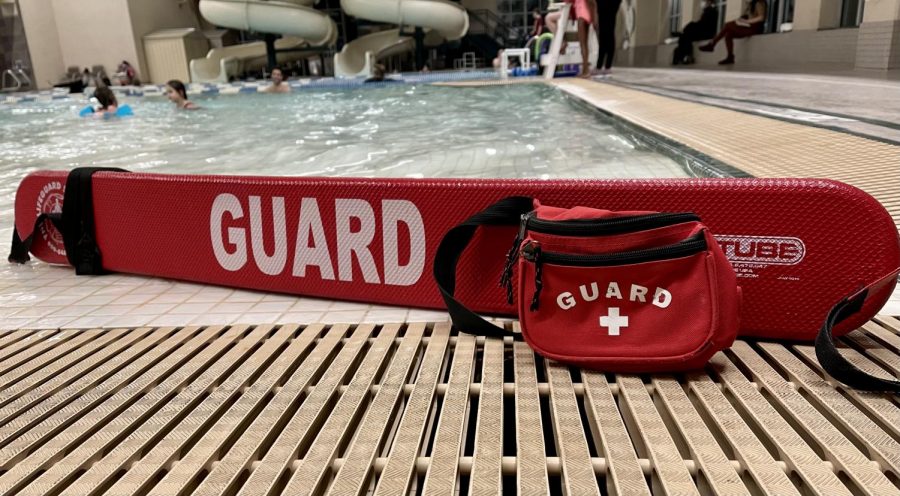Looking into the life of a lifeguard at Metea
Grace’s love for being in the water is what fuels her love for lifeguarding.
February 4, 2021
As high school sports continually struggle throughout the pandemic, the unsung heroes such as Metea’s lifeguards work behind the scenes at swimming practices to ensure the safety of the players. One of these lifeguards is sophomore Grace Cronin who currently guards the boys’ swim and dive team during their practices. Although the job is not generally high intensity, it takes much more than hard work to handle the responsibilities that come with the job.
“Being a swimmer makes me passionate about being a lifeguard because I have always loved the pool,” Cronin said. “I also am passionate about making the pool a safe environment for everyone which is why lifeguarding is perfect for me.”
Cronin made Metea’s swim team freshman year, however, a bad reaction to the pool water complicated her engagement on the team.
“The water for the Metea pool caused the skin on my hands and feet to peel off,” Cronin said. “I tried many different creams and prescriptions to try and stop the peeling because, along with that, it made my skin burn.”
Although Cronin visited many doctors, no one could figure out what was causing the reaction, which made her eventually quit the team. Before trying out for Metea’s team, however, Cronin swam competitively for seven years and had thoroughly enjoyed it. After lifeguarding over the summer and enjoying it, Cronin looked for long-term jobs as the summer ended.
“This recent summer I worked as a lifeguard for my local pool, Hobson West,” Cronin said. “It is only open during the summer, so I looked into a lifeguard job and found out that Metea needed a lifeguard.”
Applicants must meet three required certifications: First Aid, CPR, and Lifeguard training. Cronin herself was certified as a lifeguard through the Ellis and Associates program, which had good in-person water training. Besides the technical skills necessary to learn, there is also a certain group of people that lifeguarding appeals to.
“I would say it appeals to people who have a connection to swimming or water sports because otherwise, it would be hard to decide if someone is struggling in the water,” Cronin said. “I also believe that this job should appeal to people who have a long attention span because you need to be focused for a long time.”
Even if you are a good candidate for lifeguarding there is also immense responsibility that comes with the job. An important guideline in lifeguarding is maintaining the rule of 10/20.
“This rule means that you can scan the pool in 10 seconds to recognize someone is in distress,” Cronin said. “The 20 seconds stands for reaching the person in 20 seconds and beginning rescue care.”
Already a complicated job, the pandemic has added many precautions to the lifeguarding system to ensure absolute safety to the lifeguard and swimmers.
“[Personal protective equipment] is one of the major precautions you need to take as a lifeguard because, at the pool, there can be situations where you are susceptible to infectious diseases,” Cronin said. “[Hobson West] has certain regulations we need to follow for the pandemic. If someone was drowning and we needed to save them, we would perform the normal rescue move. However, when rescuing someone, we will not perform the rescue breaths in the pool. Once the person is out of the pool we must put on our full [personal protective equipment] before we can attend to them.”
This personal protective equipment, or PPE, consists of gloves, a face shield, safety glasses, and pulling back your hair. Cronin keeps her distance from others while on the job most of the time and wears a mask while up in the lifeguarding chair.
As for the scheduling of lifeguarding shifts, Cronin generally works two days a week for two to four hours at a time. Metea pays the lifeguards $11 an hour, while most public pools, like Hobson, pay around $8 an hour. During your shift, it is important to not get distracted and remain observant in case anyone’s life is in danger.
“As a lifeguard, it is my job to be there if something happens,” Cronin said. “However, I hope to never have to save someone.”
Along with the source of income, becoming a lifeguard also has many life skill benefits that can be life long.
“As a lifeguard, you learn [how to be an ETM] level first aid, CPR, and how to save someone from the water, which are all very important,” Cronin said. “I would also say become a lifeguard because it is a great environment to meet new people and broaden skills.”
Cronin plans on working for Hobson over the summer and for Metea again her junior year. She also plans to continue the job in college as well. Lifeguarding has become a huge part of her life and will continue to be a part of her life well into the future.










Todd Redman • Feb 4, 2021 at 11:57 am
This is an interesting and inspired article. Go Go MV Newspaper!